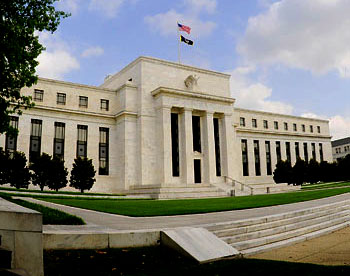 Matt Yglesias comments on the prospect of the Fed finding itself on a tighter congressional leash in the future:
Matt Yglesias comments on the prospect of the Fed finding itself on a tighter congressional leash in the future:
I think common sense holds that the Fed is losing some of its independence because the world is mired in a giant recession. When Paul Volcker was seen as having licked inflation, and then Alan Greenspan was seen as having delivered a “Great Moderation” spanning two decades, then politicians hesitated to challenge Fed leaders. With unemployment at 10 percent, people get antsy and start giving the Fed a hard time.
Personally, I welcome the idea of more attention to the importance of the Fed and its activities, but I’m not hearing a ton of constructive ideas from the Hill. The idea of “auditing” the Fed seems largely besides the point, like if your big worry was that John Roberts might be embezzling office supplies rather than issuing bad rulings.
This is pretty much where I am. If we put a Consumer Finance Protection Agency inside the Fed, then the Fed is going to have accept more oversight. After all, consumer protection just isn’t the kind of thing that anyone thinks ought to be “independent.” Frankly, though, that’s a better argument for putting the CFPA elsewhere than it is for subjecting the Fed to more oversight.
More broadly speaking, I guess my problem is this: I don’t mind stronger congressional oversight of the Fed’s regulatory functions. But Congress does a lousy job of this on a day-to-day basis, and we’d be a lot better off if they didn’t pretend otherwise and instead just tied the Fed’s hands a little more strongly via statute. That’s how you get better regulation.
But what most people seem to have in mind when they talk about increased oversight is even worse. They’re upset about the extraordinary actions that the Fed took during the financial crisis, and they don’t want the Fed freelancing like that anymore. But that’s crazy. The Fed didn’t regulate well and it didn’t manage the housing bubble well, but the one thing it did do well was react to the crisis once it hit. That’s the one place where having a free hand worked. If Congress had been involved in this stuff, it’s even odds that unemployment would be at 20% today, not 10%.1
As for monetary policy, that’s even worse. Maybe I like Ben Bernanke’s monetary sentiments and maybe I don’t, but Fed independence in this realm really does strike me, like democracy, as the worst possible system except for all the others. I know that inflation hawkery is out of style right now, but I’m a little more sympathetic to it than most. It’s one of those reputational things that takes decades to build up and just a few days to lose if you abandon it during a crisis, so a bias toward hawkery isn’t altogether a bad thing. And in any case, even if Bernanke is keeping things tighter than I would, I trust Congress to stick its oar into this about as much as I trust Homer Simpson to keep his hands off the donuts.
So the whole “Fed audit” thing doesn’t do much for me. If Congress wants stronger regs, it should write stronger regs. As for the rest, until we genetically engineer better congressmen, Fed independence is probably something we should stick to. I’m open to counterarguments, though.
1No, I’m not joking. The thought of Congress being seriously involved in this just sends shivers up my spine.
UPDATE: Dean Baker disagrees. This is bad news since I’m not generally keen on disagreeing with Dean. However, his view seems to be that the Fed should disclose its actions after a certain period of time, not that it should make everything public as it happens. I could probably live with that.













